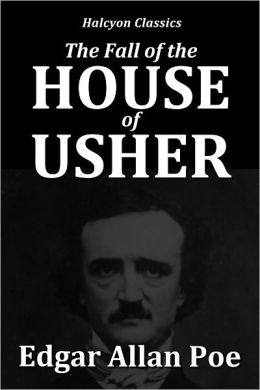Edgar Allan Poe and the Fall of the House: The Tale of the Announced American Apocalypse
It was never clear what Edgar Allan Poe thought of slavery, although he grew up in Richmond (VA), a town with an important position in the slave trade. So he was familiar with slavery since his youth, and later he studied at the University of Virginia and served with the army in the southern states of South Carolina and Virginia.
He lived and worked his whole adult life in Richmond, Baltimore, Philadelphia and New York, so he was a southern gentleman at home in the north. And he was certainly aware of the slavery issue that created increasing tensions in the young United States.
And yet, his tales and poems give no direct clues. In fact, the word ‘slavery’ occurs only once, in the introduction of ‘Eureka‘, where ‘bigotted savans’ are ridiculed for their ‘moral slavery’ of a limited vision. The word ‘slave’ occurs five times in a metaphorical sense, like a poet who is a slave of the loved woman (in ‘To Helen’) or a narrator who is the slave of circumstances beyond human control (in ‘William Wilson’).
 The word ‘negro’ also occurs a few times in Poe’s tales, but never in direct connection with slavery. A negro in Poe’s tales is always a free man (like the ship’s mutious and cruel cook in Arthur Gordon Pym’, or the servant in ‘The Spectacles’). The negro Jupiter, who is a main character in ‘The Gold Bug’, is a freed slave who voluntarily remains with his former master, to keep him out of trouble. In astrology, of which Poe had some knowledge, the planet Jupiter is associated with loyalty, honor, generosity and treasure, as is all the case in this tale.
The word ‘negro’ also occurs a few times in Poe’s tales, but never in direct connection with slavery. A negro in Poe’s tales is always a free man (like the ship’s mutious and cruel cook in Arthur Gordon Pym’, or the servant in ‘The Spectacles’). The negro Jupiter, who is a main character in ‘The Gold Bug’, is a freed slave who voluntarily remains with his former master, to keep him out of trouble. In astrology, of which Poe had some knowledge, the planet Jupiter is associated with loyalty, honor, generosity and treasure, as is all the case in this tale.
Poe’s tales are metaphors and allegories for the society in which he lived, including racism and discrimination. But he was no racist himself, as is proven by his magnum opus ‘Eureka’ in which he speaks of “The utter imposibility of any one’s soul feeling itself inferior to another; the intense, overwhelming dissatisfaction and rebellion at the thought.”
Poe’s tales were often inspired by intriguing events, like the murder of a woman (‘The Mystery of Marie Roget’), the demonstration of an ‘intelligent’ robot (Maelzel’s Chess Player’) or fantastic claims by charlatans, mesmerists and scientists. The tales also show that Poe was often critical and cynical of the society in which he lived, like in ‘Some Words with a Mummy’ and ‘Mellonta Tauta’. He has even been accused of being ‘anti-democratic’, but it is more likely that he ridiculed a corrupt political system that used and abused democracy for its own ends and needs.
However, some Poe-biographers saw metaphorical pointers toward slavery in his tales. One of these is the apocalyptic ‘The Masque of the Red Death’ (1841), in which a rich and hedonistic upper class isolates itself from a society that is suffering from a rampant and deadly disease; a pandemic that is caused and spread by this upper class itself and to which it eventually succumbs.
 This can be seen a methaphor for the ante-bellum South, but there is another event that gives a better explanation for this tale, namely the catastrophic crisis in the US monetary and financial system, ‘the Great Panic of 1837′, and the ensuing years of economic depression and hardship. This severe crisis was caused by banks and politicians who were more interested in their short term profits and bonusses than in the long term common welfare.
This can be seen a methaphor for the ante-bellum South, but there is another event that gives a better explanation for this tale, namely the catastrophic crisis in the US monetary and financial system, ‘the Great Panic of 1837′, and the ensuing years of economic depression and hardship. This severe crisis was caused by banks and politicians who were more interested in their short term profits and bonusses than in the long term common welfare.
And there were also underlying problems for this disaster, due to the divergent economies and mentalities of the northern and the soutern states, plus a shaky monetary union that was introduced before a real political union was established. The present monetary and economic crisis in the European Union has a striking and frightening resemblance with the United States before, during and after 1837.
And this brings us to Poe’s most famous tale ‘The Fall of the House of Usher’ (1839), that was also inspired by the distress after 1837, but in which the growing tension and treatening separation between the northern and southern states are the main themes. In this story, the twins Roderick and Madeline Usher inhabit their ancestral home, which has become a house of doom and gloom.
Moreover, the house is cracked and divided by a fissure that runs from the roof all the way down into the foundations. Roderick is a man of the world, who has returned home because he feels weak, agitated, nervous and a ‘bounden slave’ of his fear for the future.
His twin-sister Madeline, who always lived to herself in the house, suffers from a mysterious disease that is characterized by apathy, a gradual wasting away and attacks of catalepsy. The sinister and exited physician of the family is powerless against this disease. After one of the catalepsy attacks Roderick declares his sister dead and temporarily entombs her in a cellar under the house.
 However, Madeline isn’t dead and after she awakens from her stupor she breaks out of the cellar and violently attacks her brother, killing him and herself. After this double murder-suicide, the fissure rapidly widens and the house collapses into the waters of the deep tarn in which it once stood.
However, Madeline isn’t dead and after she awakens from her stupor she breaks out of the cellar and violently attacks her brother, killing him and herself. After this double murder-suicide, the fissure rapidly widens and the house collapses into the waters of the deep tarn in which it once stood.
In this metaphor the House of Usher represents the divided USA, and Roderick and Madeline represent the northern and southern states which eventually engage in an apocalyptic clash that destroys the country. If the sinister and exited physician represents the abolitionist movement, Poe clearly does not believe in that solution.
Because this tale shows that Poe considered the ante-bellum US to be in a desperate and hopeless condition that had strayed far from the enlightened dream of its founders. The poem ‘The Hauted Palace’ in the tale confirms this, as well as the brightly lit space that is buried somewhere deep below the doomed House.
And the conclusion from this tale can only be that Poe saw slavery as a weakening and fatal disease that would eventually destroy the American society in which he lived. But unfortunately that was a prophetic vision that he could never speak out openly, on neither side of the Mason-Dixon Line.

René van Slooten is a leading ‘Poe researcher’, who theorizes that Poe’s final treatise, ‘Eureka’, a response to the philosophical and religious questions of his time, was a forerunner to Einstein’s theory of relativity. He was born in 1944 in The Netherlands. He studied chemical engineering and science history and worked in the food industry in Europe, Africa and Asia.The past years he works in the production of bio-fuels from organic waste materials, especially in developing countries. His interest in Edgar Allan Poe’s ‘Eureka’ started in 1982, when he found an antiquarian edition and read the scientific and philosophical ideas that were unheard of in 1848. He became a member of the international ‘Edgar Allan Poe Studies Association’ and his first article about ‘Eureka’ appeared in 1986 in a major Dutch magazine. Since then he published numerous articles, essays and letters on Poe and ‘Eureka’ in Dutch magazines and newspapers, but also in the international magazines ‘Nature’, ‘NewScientist’ and TIME. He published the first Dutch ‘Eureka’ translation (2003) and presented two papers on ‘Eureka’ at the international Poe conferences in Baltimore (2002) and Philadelphia (2010). His main interest in ‘Eureka’ is its history and acceptance in Europe and its influence on philosophy and science during the late 19th and early 20th centuries.

The Edgar Allen Poe Society disagrees with you. https://www.eapoe.org/pstudies/ps1970/p1974201.htm
I’d be surprised if it were otherwise, honestly.
How is it even possible for this article to completely overlook Poe’s Hop-Frog, a short story of two slaves violently gaining their freedom? Am I missing something here?
Now wait just a minute… I thought he manumitted said slave. This certainly wasn’t a process done on the cheap!
Check on to whom the slave was sold. Henry Ridegeway was a free black man with the profession of a laborer. Also, the amount that the slave was sold for, $41, is far under market value for a young male slave during that time frame. It is possible that Poe sold the slave into freedom through Mr. Ridgeway. And just a clarifying note, Ridgeway signed the document with only an “X” indicating that he was not able to read or write.
Hey Al, You’re probably right, and you’re on to something but the Fall…is not a documentary of an actual event.
Comment/addition by the author René van Slooten.
There is an even more intriguing explanation for the medical doctor of the House Usher, because he and his predecessors can be seen as metaphors for the first eight presidents of the USA, of whom six were accepting slavery or were even slave holders themselves. When Poe wrote ‘The House of Usher’ in 1839, Martin van Buren was the eight president of the USA, so he would be the house physician in the tale. This agrees with the fact that this ‘doctor’ is apparently also powerless against the problems of Roderick Usher (the Great Panic of 1837). As a person Martin van Buren was against slavery, but he accepted it as a lawyer; a double hearted attitude that clearly annoyed Poe. It is also interesting to note that the narrator cannot understand the exited remarks of the physician, Poe’s reference to the fact that Van Buren was born in the USA, but his native language was Dutch because he grew up in a Dutch speaking community.